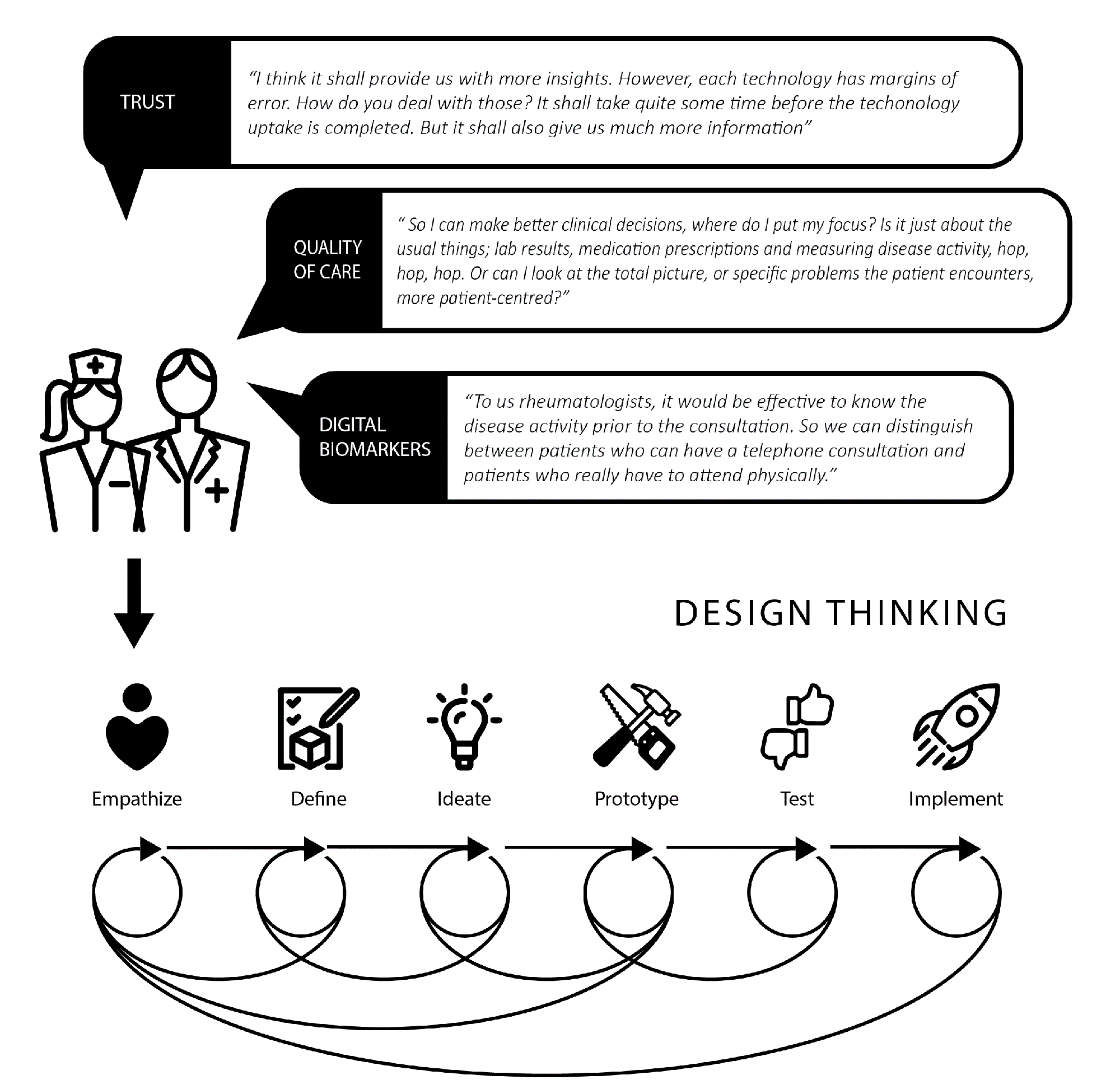Session Information
Session Type: Poster Session A
Session Time: 9:00AM-11:00AM
Background/Purpose: During times of social-distancing, in-person outpatient visits were greatly reduced. Health care professionals (HCPs) were dependent on the patient’s reported experience of their disease activity in their assessments of the wellbeing and inflammatory state, due to lack of physical assessments. Digital biomarkers can support real-world continuous measurements and offer a method for remote quantification of inflammatory joint disease. They are defined as objective, quantifiable, physiological and behavioural data that are collected and measured with digital devices.
This study uncovers the HCPs perspective on current manners of disease activity monitoring, easing their workload and the potential of digital biomarkers.
Methods: A Design Thinking approach is followed for digital biomarker development. It is a human-centered problem solving approach that leverages iteration, empathy and collective idea generation to tackle complex challenges. Semi-structured online focus group discussions were conducted. Pilot 1-1 interviews were executed to assess the interview script. The script is underpinned by the graphical framework for clinical decision making (Charlin 2012) and the theoretical domain framework (Cane 2012). One moderator and three alternating observers facilitated the sessions. All interviews were audio-recorded, transcribed to verbatim and coded.
Results: Six focus groups were organised, with a total of 28 HCPs. Participants were rheumatologists (N= 19, age 47 ± 9, 50% male) and rheumatology nurses (N = 9, age 51 ± 6, 0% male). The main findings about digital biomarkers in relation to current practices were: Trust; HCPs felt self-assured about their own abilities of physical evaluation, reading patients and their gut feeling. Trust in flare detection with digital biomarkers and machine learning was low. It was expected that much disease activity is missed and many false-positive flares are detected. Biomarkers should be valid, reliable and sensitive to change. Innovation should improve quality of care; No consensus about a golden standard of care exists. HCPs were afraid that with digital biomarkers personal interaction recedes to the background and quality of care is compromised. Personal interaction was marked as essential to raise sensitive topics and stimulate therapy adherence. Benefits of digital biomarkers; HCPs enjoyed the delivery of efficient and effective care. They disliked repetition and the high administrative burden. In the HCPs opinion digital biomarkers could establish disease activity prior to the consultation, so time could be spent on what matters to the patient. New technologies should however not add to frustrations and make way for things that really matter.
Conclusion: The following problem statement from the HCPs perspective can be formulated: “In limited time we take many actions. We spend time on both disease and emotional support of our patients. Our workload is high and trivial tasks such as administration take too much of our time. Instead we want to focus on what’s relevant to the patient. We are confident about our own abilities and, only if technology is proven to be valuable, valid, reliable and accepted by our patients it can be used in clinical practice.”
To cite this abstract in AMA style:
de Groot p, Luime J, Kok M, vis m, Tchetverikov i. Discovering the Potential of Digital Biomarkers in the Work Process of the Rheumatology Healthcare Professionals, a Design Thinking Approach; Preliminary Results of the Healthcare Professionals Perspective [abstract]. Arthritis Rheumatol. 2023; 75 (suppl 9). https://acrabstracts.org/abstract/discovering-the-potential-of-digital-biomarkers-in-the-work-process-of-the-rheumatology-healthcare-professionals-a-design-thinking-approach-preliminary-results-of-the-healthcare-professionals-perspe/. Accessed .« Back to ACR Convergence 2023
ACR Meeting Abstracts - https://acrabstracts.org/abstract/discovering-the-potential-of-digital-biomarkers-in-the-work-process-of-the-rheumatology-healthcare-professionals-a-design-thinking-approach-preliminary-results-of-the-healthcare-professionals-perspe/

